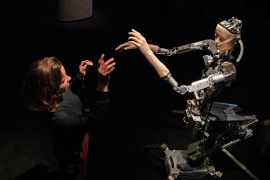
By John Villasenor
Can an artificial intelligence (AI) system be a named inventor on a United States patent? No, says a federal appeals court in a decision issued earlier this month. The case, Thaler v. Vidal, arose from two patent applications filed in 2019 by Stephen Thaler, naming an AI system he calls DABUS (for “Device for the Autonomous Bootstrapping of Unified Sentience”) as the “inventor.”
After the U.S. Patent and Trademark Office (PTO) informed Thaler that the applications were incomplete because they did not list a human inventor, he filed a complaint in a federal district court in Virginia. In September 2021, that court ruled against Thaler, citing “the overwhelming evidence that Congress intended to limit the definition of ‘inventor’ to natural persons.”
Thaler then appealed to the Court of Appeals for the Federal Circuit, which on August 5, 2022 issued a ruling affirming the district court’s decision. The Federal Circuit noted that while it might initially seem that resolving Thaler’s claims would require “an abstract inquiry into the nature of invention or the rights, if any, of AI systems,” in fact there was no need to “ponder these metaphysical matters.” Rather, the Federal Circuit focused its attention on the statutory interpretation of the term “inventor.”
The U.S. Patent Act defines an inventor as “the individual or, if a joint invention, the individuals collectively who invented or discovered the subject matter of the invention.” While the Patent Act does not define an “individual,” the Federal Circuit cited a 2012 Supreme Court decision that held, in relation to text associated with a different statute, that an “individual” is ordinarily understood to be a human being. The Federal Circuit concluded that in passing the Patent Act, “Congress has determined that only a natural person can be an inventor, so AI cannot be.”
AI and Inventorship in Other Countries
The United States is one of multiple jurisdictions where Thaler has sought to obtain patents listing DABUS as the inventor. It has been a bumpy road. A U.K. appeals court, the European Patent Office, the Federal Court of Australia, and the German Federal Patent Court have all declined to allow patent applications that do not list a human inventor. (The German court did, however, identify a potential path forward under which an application could list Thaler as the inventor, while also recognizing that DABUS played a role in the invention.)
The most notable exception to date has been in South Africa, where in July 2021, the Companies and Intellectual Properties Commission (CIPC) granted a patent listing the inventor as DABUS. However, South Africa differs from the other jurisdictions mentioned above in that it does not have what is known as a “substantive patent examination system” through which the government evaluates the merits of a patent application before granting a patent. Rather, as Meshandren Naidoo and Christian E. Mammen noted in Patently-O, in South Africa “all that is required in a formal examination (also known as a registration-based system) is for the application forms and fees to be in order with the specification documents attached. If these affairs are in order, the patent will summarily be granted by the CIPC.”
A Key Policy Issue: Patentability of AI Inventions
As they should, patent offices and courts in the U.S. and elsewhere have focused on applying patent laws as they are currently written. That means, however, that they are not being asked to fully engage with some of the more fundamental patent policy questions that are arising as AI systems become increasingly sophisticated.
What happens when, as Thaler asserts occurred with DABUS, an AI system outputs an invention that no person conceived? Putting aside what the current language of the U.S. Patent Act and the associated regulations requires or prohibits, as a policy matter, should an invention that would be patentable if AI were not involved become unpatentable for the sole reason that it was created using AI?
A first option is to declare AI inventions unpatentable. But this would require defining what an “AI invention” is, and lead to a proliferation of disputes regarding whether inventions are within that category. The risks and costs associated with these disputes would undermine the incentive at the heart of the patent system, which aims to promote innovation by providing a time-limited set of exclusive rights in exchange for disclosures of inventions to the public. For example, to the extent that AI can create new disease-fighting drugs that would have otherwise remained undiscovered, it would be bad policy to disincentivize pharmaceutical researchers and companies from investing time, effort, and capital in AI-based drug-discovery approaches.
A second option is to conclude that the use of AI should not render unpatentable an otherwise patentable invention. This would preserve the innovation-promoting incentives that the patent system was designed to foster. But it would lead to complex questions of inventorship. As the International Association for the Protection of Intellectual Property stated in a 2020 resolution, “given the ability of AI systems to ‘learn,’ traditional notions of inventorship may be challenged.”
Under this second option, it seems reasonable to attribute inventorship to the natural persons behind the AI, thereby avoiding the many problems that would arise if AI systems were deemed inventors. Of course, this attribution process would raise its own substantial complexities given the varying roles people play in designing, programming, training, and evaluating the outputs of AI systems. And it would require rethinking the current framework under which, as the U.S. PTO explains in a widely referenced but non-binding guidance document, the “threshold question in determining inventorship is who conceived the invention.”
The upshot is that AI will be a core part of the process of creating a growing number of inventions in the coming years. If patent systems are to be maximally effective in their crucial role as drivers of innovation, they will need to engage with this new reality.











